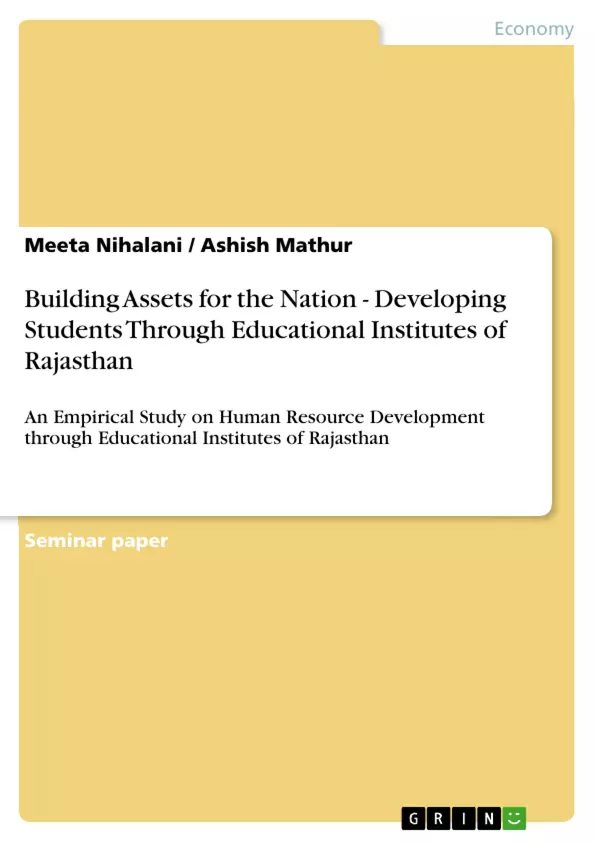Abstract
The human resource development is important for any society because it builds the professional assets of the country. They are more valuable than capital because the human beings can mobilize the other inputs to build the empires of any business system. The professionalism in the industry can be built by the education given to the people in the state. The quality of human resources is generated by the institutes present in any state. The aim of the paper is to build the strategic framework for the development of quality human resource by the educational institutes of Rajasthan. The basic objective is to analyses the perceptions of the students to the development of the social qualities by the institutes
Inhaltsverzeichnis (Table of Contents)
- Abstract
- Introduction
- Literature review
- Objective of the study
- Hypothesis
- Research Methodology
- Sampling Area
- Population
- Sample size
- Sampling Design
- Primary Data
- Secondary data
- Research instruments
- Analysis of Data
- Data analysis
- Total satisfaction
Zielsetzung und Themenschwerpunkte (Objectives and Key Themes)
This paper aims to develop a strategic framework for the development of quality human resources in educational institutes of Rajasthan. The objective is to analyze student perceptions of the development of social qualities within these institutes.
- The role of education in developing professional skills and contributing to societal growth
- The importance of educational institutions in shaping social qualities and generating development
- The impact of technology on education and the need for institutions to cultivate technical skills and learning maturity
- The development of social and technical skills to ensure successful employment and career management
- The impact of university human resource development on students, learning, research, and collaboration
Zusammenfassung der Kapitel (Chapter Summaries)
- Abstract: This section introduces the paper's focus on human resource development through educational institutes in Rajasthan. It emphasizes the importance of human capital for national growth and the need for a strategic framework for quality human resource development.
- Introduction: The introduction highlights the crucial role of education in cultivating professional skills and developing a thriving society. It explores the challenges faced by educational institutions in adapting to technological advancements and meeting the needs of a globalized world.
- Literature review: This section presents a compilation of existing research on education's impact on human resource development, highlighting perspectives on the role of education in societal progress, technical skill development, lifelong learning, and the importance of universities in addressing national development challenges.
- Objective of the study: The objective of the study is clearly stated, emphasizing the analysis of the impact of education on student development, specifically focusing on the development of social skills and the identification of strategies for enhancing educational quality in Rajasthan.
- Hypothesis: The study outlines its hypotheses concerning the relationship between student satisfaction, social skills development, and demographic factors such as gender, age, and education level.
- Research Methodology: This section details the research approach, including data collection methods, sampling design, and the development and use of a structured questionnaire for gathering student perceptions.
- Sampling Area, Population, Sample size: These sections specify the geographic scope of the study, the target population, and the sample size used for data collection.
- Sampling Design, Primary Data, Secondary Data: This section describes the methodology used for selecting participants, the sources of primary data, and the sources of secondary information utilized in the study.
- Research instruments: The research instruments employed in the study are outlined, focusing on the use of a summated rating scale to evaluate student satisfaction and the impact of independent variables on student development.
- Analysis of Data: This section explains the data analysis approach, emphasizing the use of SPSS version 16 software and outlining the application of ANOVA analysis for examining the relationships between dependent and independent variables.
- Data analysis: This section delves into the application of ANOVA analysis and its guidelines, highlighting the use of the test for linearity and non-linearity and its preference over bivariate correlation tests. It further discusses the importance of homogeneity of variance tests and the application of Post-hoc comparisons.
- Total satisfaction: This section focuses on the analysis of student satisfaction data, presenting the results of normality tests and homogeneity of variance tests.
Schlüsselwörter (Keywords)
The study focuses on key themes of education, human resource development, social capital, and quality education in the context of Rajasthan. It delves into student perceptions, social skills development, and the role of educational institutions in fostering national development.
Frequently Asked Questions
What is the main objective of this study?
The study aims to develop a strategic framework for quality human resource development in educational institutes across Rajasthan, focusing on student perceptions.
Why is human resource development important for Rajasthan?
Human resources are considered more valuable than capital because they mobilize other inputs to build professional assets and business systems for the nation.
What role does technology play in this educational framework?
The study explores how institutions must adapt to technological advancements to cultivate technical skills and learning maturity in a globalized world.
What methodology was used for data analysis?
The researchers used SPSS version 16, employing ANOVA analysis and homogeneity of variance tests to examine student satisfaction and social skills development.
Which demographic factors were considered in the hypotheses?
The study examined relationships between student satisfaction and factors such as gender, age, and education level.
- Citar trabajo
- Dr. Meeta Nihalani (Autor), Dr. Ashish Mathur (Autor), 2005, Building Assets for the Nation - Developing Students Through Educational Institutes of Rajasthan, Múnich, GRIN Verlag, https://www.grin.com/document/184480



